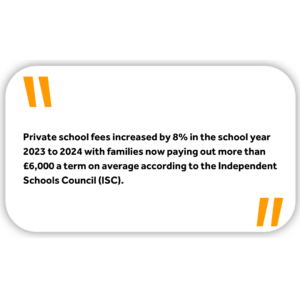How To Manage The Cost of School Fees
Adviser Insight is a thought leadership series showcasing the perspectives and expertise of our firm’s financial advisers. Each article offers in-depth analysis on topics shaping the financial landscape, grounded in practical experience and strategic thinking.
In this edition, we explore adviser insights on school fees, providing valuable guidance for families navigating the complexities of educational expenses. Our financial advisers share strategies to effectively manage these costs while ensuring that savings and investments are optimized for long-term success. Whether you are planning for private schooling or considering higher education expenses, our insights aim to empower you with the knowledge needed to make informed decisions.
Although there are no direct tax reliefs when it comes to the cost of a private education there are ways in which we can help clients.
Private school fees increased by 8% in the school year 2023 to 2024 with families now paying out more than £6,000 a term on average according to the Independent Schools Council (ISC).
By investing a lump sum into an offshore bond, parents or grandparents can act as trustees. This structure allows for effective wealth management. A key advantage of offshore bonds is their ability to be divided into smaller policy segments. This feature enables partial encashment to cover school fees on an annual basis.
We’ve seen private school fees in the UK steadily rising in the past few years due to a combination of high inflation and increased employer contributions to the Teachers’ Pension Scheme. With the removal of VAT- exempt status in January 2025, school fees have increased by a further 20% for many families.
So, it’s no surprise then that advisers are seeing more clients who want to know more about cost-efficient and tax-effective ways to fund private education.

Although there are no direct tax reliefs when it comes to the cost of a private education, there are ways in which we can help clients. Indeed, there are several key financial strategies available, including borrowing, intergenerational gifting and tax-efficient investments to minimise costs and serve as a safeguard against future changes in tax regulations.
Rising School fees
There’s no doubt that the cost of private education in the UK can be substantial. Private school fees increased by 8% in the school year 2023 to 2024, with families now paying out on average, more than £6,000 a term, according to the Independent Schools Council (ISC). Its survey, carried out in early 2024 showed that the average fee for a day school is now £6,021 per term or £18,064 per annum. There are also differences between school types, with boarding school fees the highest, at £14,153 a term on average.

It also found that around a third (33.5%) of all ISC pupils receive some help with their fees. Around £1.4 billion was spent on providing fee assistance this year, which includes bursaries and scholarships, an increase of 10.2% from last year.
Given that the number of new pupils joining private schools has dropped by 2.7% during this same timeframe, it’s easy to assume that imposing further costs would tip the balance for some families.
Indeed, imposing 20% VAT on school fees has obviously hiked costs further. A school with annual fees of £20,000 will now have increased them by an extra £4,000 per year, pushing the total cost to £24,000 annually.
So, it makes sense to look at ways to prepare for this anticipated additional cost, where possible.
Tax-Efficient Investments
Tax-efficient investments can be a sensible option. While there are no specific tax reliefs available, there are several investment options that can minimise the tax burden and add to your savings pot.
ISAs (Individual Savings Accounts) are the most common tax-efficient savings vehicles. As of the 2024-2025 tax year, the annual ISA allowance is £20,000 per individual. Because any growth within an ISA is tax-free, parents can save up for school fees without being taxed on interest, dividends, or capital gains.
Offshore bonds too, offer a strategic, tax-efficient solution for funding school fees. By investing a lump sum into an offshore bond, parents or grandparents can act as trustees, while designating the children as beneficiaries. This structure allows for effective wealth management. A key advantage of offshore bonds is their ability to be divided into smaller policy segments. This feature enables partial encashment to cover school fees on an annual basis.
The primary tax benefit lies in assigning the bond to the child. Since the tax liability on any gains is then calculated based on the child’s tax status, typically falling within their personal tax allowance. That means that most cases result in no tax being due.
Trusts are a final investment option. They can be structured to provide for a child’s education and can be managed by trustees. This allows wealth to be passed down in a structured way while avoiding excessive taxation.
Intergenerational Gifting
Intergenerational gifting is another common way for families to manage the costs of private education. This strategy typically involves grandparents or other extended family members gifting money to the parents or directly to the children to fund school fees. This can be done through monetary gifts, the transfer of assets, or the provision of loans to support educational costs.
The UK has several tax-free gifting options already in place, hence why this is already a popular solution to meeting the expenses associated with private schooling. Gifts of up to £3,000 a year do not incur an inheritance tax liability, and gifts of any amount made more than seven years in advance of the giver’s death are also exempt.

Borrowing Money Against Equity
Borrowing money against equity held in a property and paying it back in affordable monthly payments over a longer period of time could also work for some people. There are mortgage products available which cater to this need. There are two options, drawing down a lump sum upfront and paying interest on the total, or agreeing a total loan amount and drawing down only as and when needed – in which case interest is only incurred on the amount drawn down, rather than the total loan agreed to.
Legal and Financial Advice
As private school fees continue to rise, families will need to explore ways to manage the financial burden of education. With careful planning and professional advice, families can secure a more affordable path to private education, without sacrificing their long-term financial health.
While there is no silver bullet when it comes to the increasing cost of school fees, these strategies alone or in combination can help. I’d also always stress the importance of seeking qualified advice to make sure that there are no unintended consequences such as exceeding tax exemption limits or setting up trusts in ways that could trigger unintended taxes.
Please note:
This article is for general information only and does not constitute advice. The information is aimed at retail clients only.
All information is correct at the time of writing and is subject to change in the future.
The value of your investments (and any income from them) can go down as well as up and you may not get back the full amount you invested. Past performance is not a reliable indicator of future performance. Investments should be considered over the longer term (minimum of 5 years) and should fit in with your overall risk profile and financial circumstances.
The tax implications of pension withdrawals will be based on your individual circumstances. Thresholds, percentage rates, and tax legislation may change in subsequent Finance Acts.
If this article has raised questions for you, feel free to get in touch!


